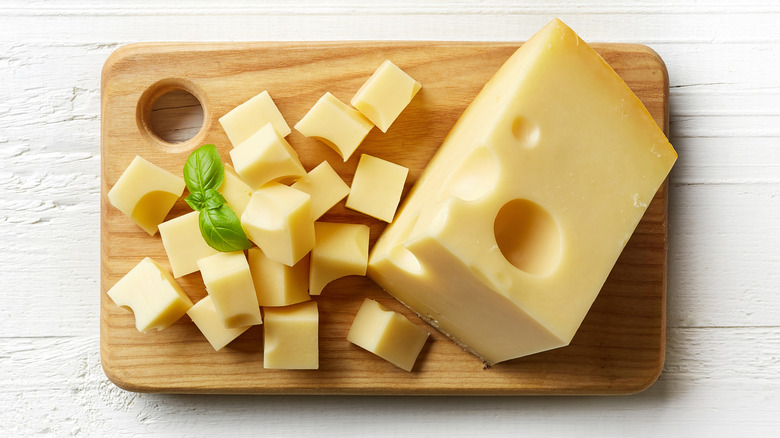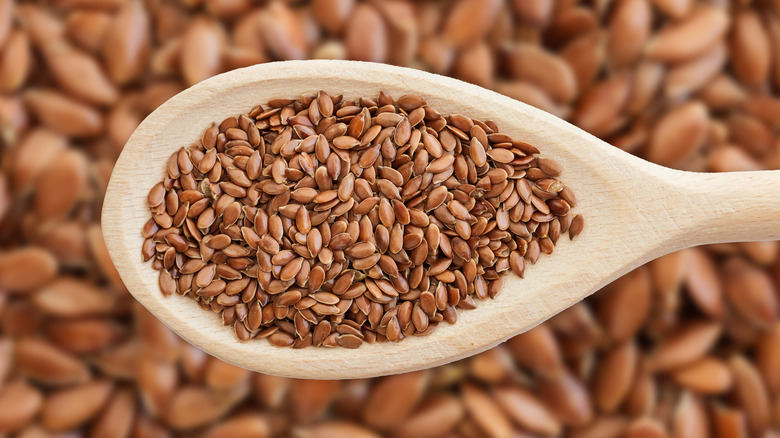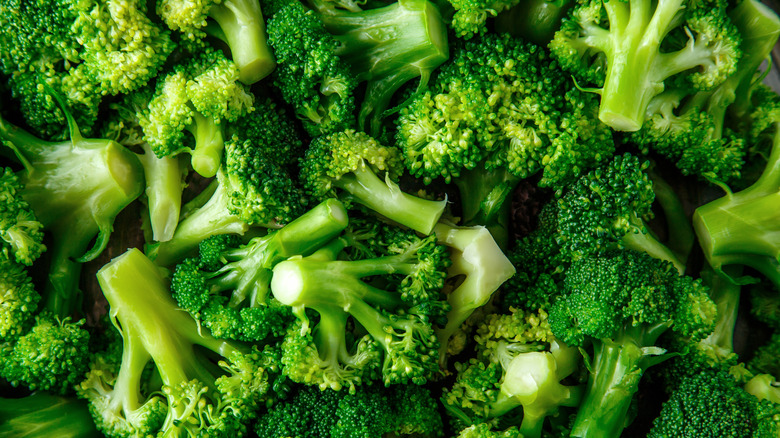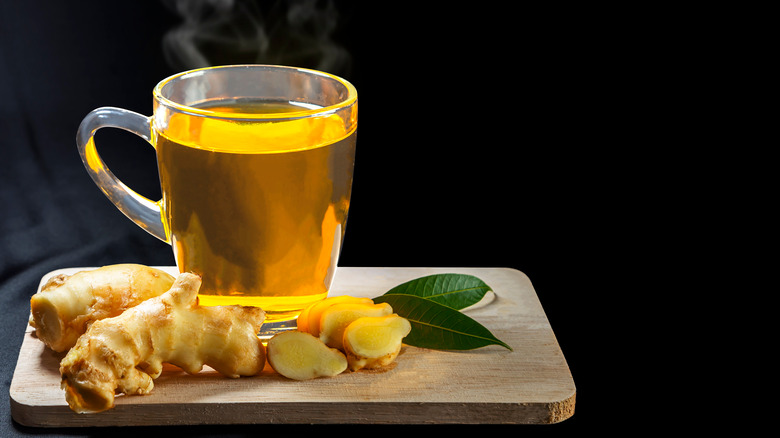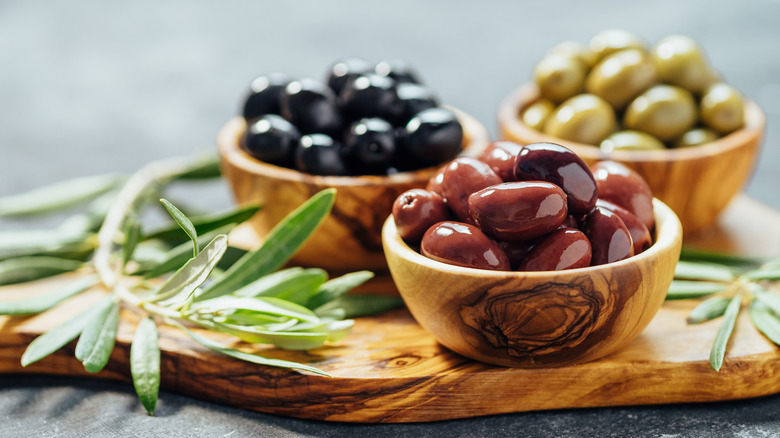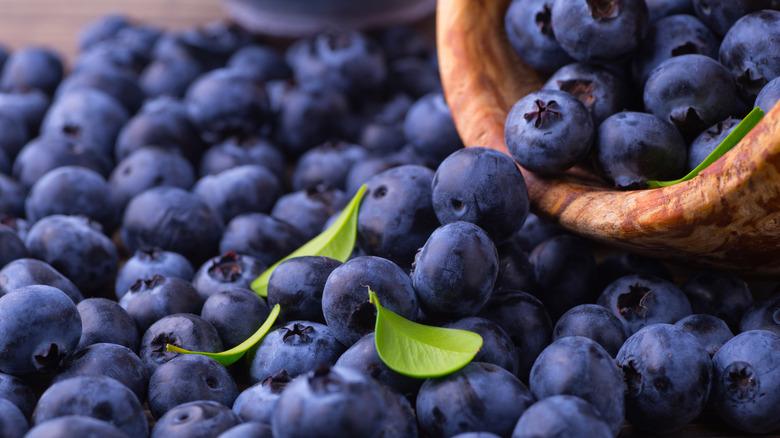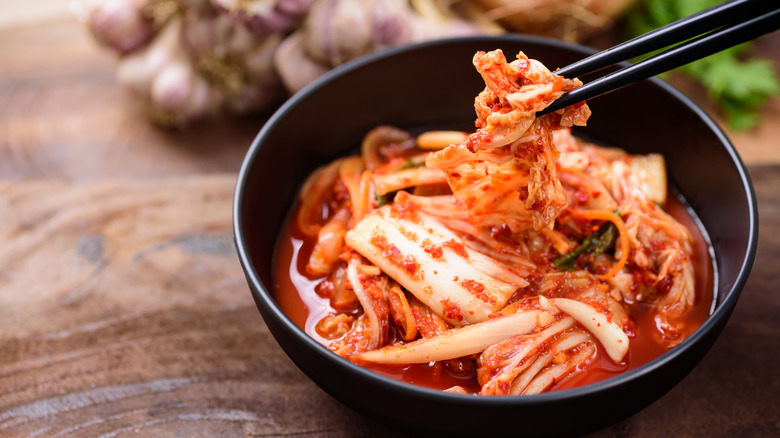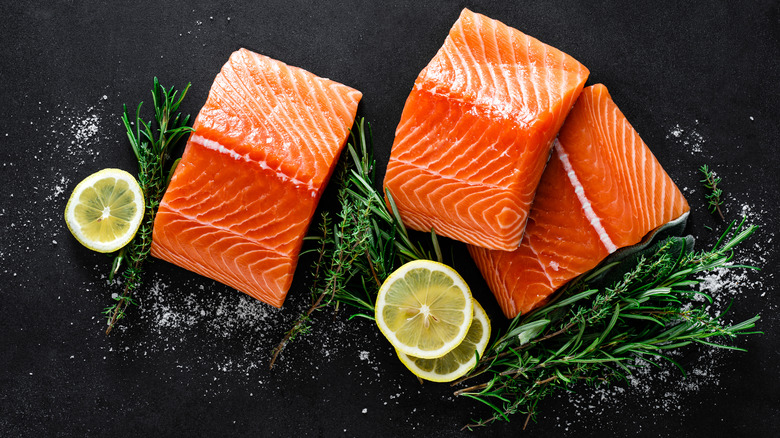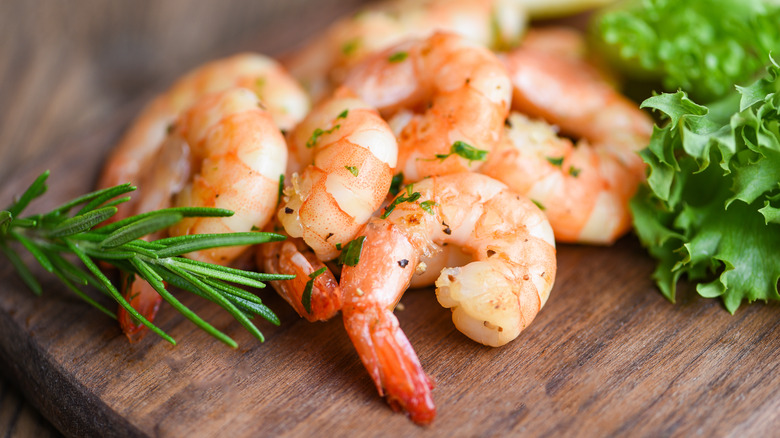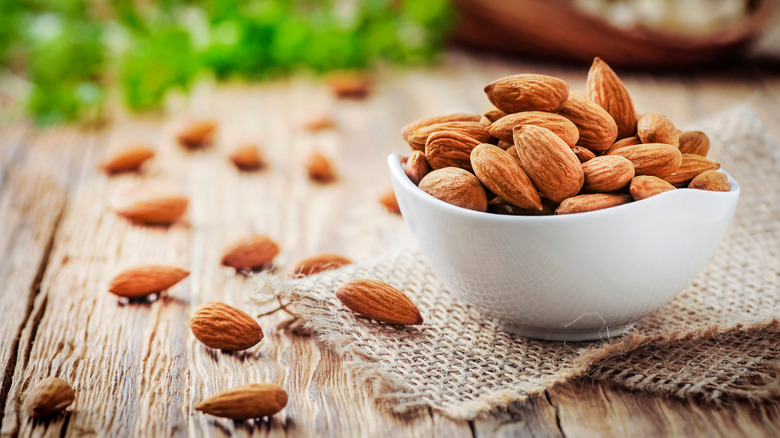7 Foods To Eat And 7 To Avoid If You Get Migraines
Here's important advice for anyone who doesn't get migraines: Never, ever say they're just bad headaches. Yes, pain is a major part of a migraine attack, but it's only one of many symptoms (via Medical News Today). If you have a migraine, that softly ticking clock on your wall can sound like someone banging a snare drum next to your head. A bright sunny day that would normally make you feel good to be alive will seem blinding and only make you feel worse. And that's not even taking into consideration the nausea, the vision issues (like seeing auras), and in some cases the left or right side of your body going weak (via Medical News Today).
Of course, the exact symptoms of a migraine can vary from person to person, and so can its causes (via American Migraine Foundation). And this is where things get a bit tricky. Unfortunately, there is no one-size-fits-all approach when it comes to foods that might bring on a migraine. Two migraineurs can eat the exact same meal, but only one person becomes sick. And since a food-triggered migraine can happen a full 24 hours after eating, narrowing down what's causing your attacks can seem impossible. But don't worry. It's not all doom and gloom when it comes to your diet and migraines. In fact, not only are there certain common food triggers that you can watch out for, but there are also foods that can help you avoid and manage attacks.
Avoid: Cheese
Does cheddar cheese taste the same as cottage cheese? No, of course not. Cheeses come in all kinds of flavors, ranging from extremely sharp and strong to very mild and light. But if you are prone to migraines, you may want to skip certain members of this food family.
According to WebMD, the reason why some cheeses may be the culprit behind a migraine is because cheese contains a substance known as monoamine or tyramine. While there are still some questions about the connection between migraines and tyramine, we do know that a specific bodily enzyme is needed to break down tyramine. If you're low on this enzyme, then the tyramine is not properly digested by your body, which can bring on migraines. Some scientists theorize that your brain releases the neurotransmitter norepinephrine in response to the tyramine, creating possible migraine-causing conditions.
Although all cheeses contain tyramine, aged cheeses have the highest amounts of it (via WebMD). So, if you get migraines, you may want to avoid Swiss, cheddar, Parmesan, feta, Muenster, Camembert, and blue cheese. But farmer's cheese, cottage cheese, cream cheese, American cheese, and soy cheese all have lower levels of tyramine, so they may be safer options for you. However, you still want to exercise portion control when it comes to cheeses, even if they aren't aged.
Eat: Flaxseed
You may know it as linseed, or might have seen it on the nutrition label for your favorite cereal (via Everyday Health). But whatever you call it, flaxseed can be very helpful if you get migraines. Why? It can be summed up in one word: anti-inflammatory (via Everyday Health). Flaxseed has high amounts of omega-3 fatty acids, which research has found are good for reducing inflammation throughout your body, which in turn can help with migraines. Omega-6 fatty acids, on the other hand, have the opposite affect and actually increase inflammation. So, does that mean that you can eat foods loaded with omega-6 as long as you eat flaxseed to counteract their affect? No, but eating less of omega-6-rich foods like corn oil, and more of foods loaded with omega-3 like flaxseed, may help lessen migraines.
Besides its possible aid to migraineurs, flaxseed may be helpful with other health issues (via Everyday Health). It's rich in fiber, which can help with digestive problems like constipation. It also might be beneficial for breast cancer patients because it contains lignan, a compound believed to have anticancer properties. In addition, flaxseed has been shown to help with high cholesterol, type 2 diabetes, and maintaining a healthy weight. However, before adding anything new to your diet (or eating something in larger amounts) make sure you first talk with your healthcare professional.
Avoid: Alcohol
It's not a shock that alcohol can cause headaches (just ask anyone who's had a hangover). So, it would seem like a no-brainer to declare them a migraine trigger. But while the evidence is stacked against beer, wine, and other alcoholic beverages, there are still unanswered questions regarding their impact on migraines.
According to the American Migraine Foundation, a person can experience a migraine anywhere from a half an hour to three hours after drinking something alcoholic, and even a little alcohol can lead to a headache in a migraineur. So, it's no wonder that alcohol is the top-reported cause of migraines (via American Migraine Foundation). However, while it seems alcohol causes migraines, it's not completely clear how it triggers such attacks. One theory is the darker the beverage, the more likely it is to trigger a migraine. Why? Because darker-colored alcoholic drinks have higher levels of tannins and flavonoid phenols, two substances believed to cause migraines. Whether or not that is the case, if you notice you get a migraine after drinking alcohol, you may want to become the ongoing designated driver for your group of friends.
Eat: Broccoli
While food can be a major trigger for migraines so can the natural hormonal fluctuations that occur in women around their time of the month (via Everyday Health). Dubbed "menstrual migraines," these attacks are directly connected to drops in the female hormone estrogen. And unlike other triggers like lack of sleep, hormone-based migraines can feel like something you can't control. However, Dr. Wynne Brown, the medical director of integrative medicine at Wake Forest Baptist Health in North Carolina, says upping your intake of broccoli can help with menstrual migraines.
As Dr. Brown tells Everyday Health, broccoli, as well as other cruciferous vegetables, can help reduce the effect estrogen has on your system. How? Well, these plants have chemical compounds called phytoestrogens. Yes, the name of these compounds does contain the word "estrogen," and as far as your body is concerned, phytoestrogen and estrogen are the same thing. As Healthline explains, phytoestrogens can bind to your estrogen receptors just like your own estrogen, and even perform some of the same functions. So if your natural estrogen levels are low, consuming the phytoestrogens in foods like broccoli may help take the place of the estrogen you're not producing. However, there are concerns about phytoestrogens' affect on overall health, so speak with your health care professional before starting a broccoli binge.
Besides providing phytoestrogens, broccoli is also an excellent source of vitamins K1, B9, and C (via Healthline). It also contains nutrients like iron and potassium, which in different ways both support your heart and circulatory system.
Avoid: Chocolate
If foods were on a migraine criminal list, chocolate would be number two after alcohol, according to the American Migraine Foundation – though there's some debate about this association. There is a possible chemical cause: When you eat chocolate, you're also consuming a chemical called beta-phenylethylamine, or PEA, which can cause a chain reaction that makes the arteries in your head contract (via National Center for Biotechnology). Since blood vessels contracting is a possible cause of headaches, the presences of PEA in chocolate may cause migraines.
But not so fast. While some studies' findings support the theory that chocolate causes migraines, others contradict it. So what about all those reported cases of people eating chocolate and getting a headache? Well, as the American Migraine Foundation points out on their website, there could be other factors at work. For example, if you're stressed, eat chocolate, and get a migraine, was it the chocolate or the stress that brought on your symptoms? Nevertheless, if you suspect chocolate is a trigger for your headaches, you're certainly not alone, and you may want to cut it out of your diet.
Drink: Ginger tea
When you have a migraine, it can be very difficult to put anything in your stomach. Besides the relentless pain in your head, you're also often nauseated, making it difficult to take oral medications for relief. But if you can manage it, drinking ginger tea may help you settle down your stomach, as well as calm other side effects of a migraine attack.
As registered dietician Ilana Muhlstein tells Shape, "Ginger can help improve a variety of migraine-related symptoms, including motion sickness, nausea, and loss of appetite." Specifically, ginger contains certain compounds called shogaols and gingerols, which have been found to help with an upset stomach (via Medical News Today). In fact, one study reported that chemotherapy patients and women who are pregnant found ginger extracts beneficial for dealing with vomiting and queasiness.
In addition, ginger may aid with the headache part of a migraine because it can reduce inflammation and pain. Some research has found that taking it in addition to medicines that reduce inflammation throughout the body can help during a migraine attack. However, if you're on medication, you should check with your healthcare professional to make sure adding more ginger to your diet won't cause a possible drug interaction. But if you're given the okay, ginger can help with other health concerns like high cholesterol, blood pressure, blood sugar fluctuations, and weight management.
Avoid: MSG
When you see the acronym MSG, you probably think of either a sports network or food. And if you're a migraineur, then those three letters could make you think twice about eating dinner at a certain restaurant or diving into a bag of chips. But how bad is this food additive when it comes to headaches?
As Verywell Health explains, enough people have reported a reaction to MSG, or monosodium glutamate, that it's a probably trigger for migraines. However, research so far has been unable to conclusively say why certain people cannot tolerate it. One possible theory is that MSG causes a reaction in your brain that affects your blood vessels and triggers a headache. But even without completely understanding why it happens, MSG sensitivity is something migraineurs need to keep in mind as they track their potential food triggers.
If you're not sure if MSG is giving you headaches, then the next time you have a migraine after eating MSG, take note if you have other common symptoms associated with monosodium glutamate sensitivity. These can include pressure in your face and chest, flushing, feeling disoriented, and your neck and shoulders feeling uncomfortably warm. In addition, if exercise or physical activity worsens your symptoms, then it may be time to cut the MSG from your meals and snacks. And one more word of warning: MSG is also naturally found in foods like tomatoes, so don't only rely on food labels to adjust your diet.
Eat: Eggs
So, let's address the elephant in the room. Yes, eggs have cholesterol, and like every other food on this list, you should speak with your doctor before you start adding more eggs to your regular eating plan. However, with that said, this chicken byproduct can also help you if you're having a migraine. As Dr. Meryle Diamond, the managing director at the Diamond Headache Clinic in Chicago, tells Good Housekeeping, "We know that patients with a migraine brain, sometimes that brain is hyper-irritable to a change in schedule and a patient may not eat regularly during a migraine attack." But not eating can further throw off their bodies, making it that much harder to recover. In particular, they need protein to help stabilize their blood sugar and get all their systems back on track. Fortunately, as WebMD points out, one egg contains 7 grams of protein. Plus, scrambled eggs are usually easier to eat with a queasy stomach than other sources of protein (like a steak for example).
Besides their benefits when you get a migraine, eggs have nutrients that may be good for weight management, as well as your memory (via WebMD). In addition, eggs have a specific type of nutrient called carotenoids. Why are these important? They support your eyes' health and may reduce your chances of developing age-related blindness.
Avoid: Olives
Before we discuss how olives can be a migraine trigger, we need to talk about a very specific type of migraine that at times is mistaken for a stroke (via Medical News Today). Known as a hemiplegic migraine, these severe attacks have some of the usual migraine symptoms like an intense headache and sensitivity to sounds and light, but they can also leave the left or right half of your body feeling weak. Other possible effects of hemiplegic migraines include seeing double and difficulty forming words, and in severe cases, the migraineur can become feverish, experience seizures, and slip into a coma.
Despite having more severe symptoms than a regular migraine, some hemiplegic migraines can also be triggered by certain foods. Specifically, hemiplegic migraines that are likely the results of genetics (known as familiar hemiplegic migraines, or FHM) can be brought on by foods containing tyramine. As WebMD explains, if your body doesn't properly break down tyramine, it may cause a domino effect that results in a migraine. And, unfortunately, much like aged cheeses, olives are loaded with tyramine.
Whether you get migraines or FHM, you may want to cut olives and all olive products out of your diet for a month to test if they're your trigger food (via American Migraine Foundation). Even if you experience fewer migraines after removing olives from your diet, you should still speak with your health care professional about your findings.
Eat: Blueberries
Whether you prefer them in pies or muffins, there's no denying that blueberries are super popular both for their sweet flavor and health benefits. And, good news, helping to combat migraines might be one more positive trait for this tiny berry. But to fully understand why, we're going to need to talk about what's going on inside of all of us on a molecular level.
As Medical News Today explains, it's more than just psychological stress that can trigger a migraine. Within your body are atoms that are missing key elements, turning them into what are called "free radicals." These free radicals can cause damage to your cells, which is known as oxidative stress. And, yes, oxidative stress can lead to migraine attacks. Fortunately, antioxidants like the kind found in blueberries can help prevent these free radicals from causing oxidative stress, as well as lessen the damage already done to your cells. So, in a nutshell, antioxidants can stop a potential migraine trigger, as well as help fortify your body against future attacks.
While the antioxidants in blueberries are impressive, they're hardly the only health perk of these berries. As WebMD notes, blueberries are also a good source of vitamin K, which is great for your heart. They've also been shown to help with blood pressure, cholesterol (specifically for people with metabolic syndrome), and blood sugar levels and insulin sensitivity in diabetics.
Avoid: Kimchi
A mixture of vegetables and hot spices that is typically either fermented or pickled, kimchi is a flavorful dish that can be eaten alongside most any meal (via The Spruce Eats). But, unfortunately, if you're a migraineur, this South Korean delicacy may be off limits. Since kimchi often contains fermented vegetables, it also has high levels of probiotics (via The Conversation). And though these live bacteria and yeasts can provide health perks, they can cause problems for migraineurs. This is because the bacteria creates compounds called amines, which include histamine and tyramine. And as The Conversation notes, amines can trigger changes in your circulatory system that may cause a migraine episode. According to Healthline, pickled vegetables can also contain large amounts of histamine, meaning that whether it's fermented or pickled, kimchi is a potential migraine trigger.
Before writing off kimchi because of its histamine content, keep in mind the American Migraine Foundation notes that the symptoms of being sensitive to histamine are not the same as the typical symptoms of a migraine attack — except, of course, for headaches. Nevertheless, if you think amines may be behind your migraines, then you may want to steer clear of kimchi, as well as other foods that contain fermented vegetables, such as sauerkraut (via Healthline).
Eat: Salmon
Did you know that salmon are a type of fatty fish? And don't let the word "fatty" fool you. These fish are incredibly nutritious and have been shown to help with depression, dementia, and attention deficit hyperactivity disorder (via Medical News Today). But beyond that, a type of fatty acid found in salmon might help reduce the frequency of migraine attacks (via National Headache Foundation).
According to the National Headache Foundation's website, salmon contains large amounts of omega-3 fatty acids, which may be good for reducing inflammation — a common migraine trigger (via Everyday Health). In fact, a university of Cincinnati study found fish oil capsules containing omega-3 fatty acids dramatically decreased the rate and intensity of migraine attacks in its participants. However, there are a couple of downsides to upping your omega-3s. Although eicosapentaenoic acid, or EPA, is a type of omega-3 found in the capsules from this study, as well as in salmon, it also can increase cholesterol levels (via National Headache Foundation and Mayo Clinic).
If you would like to speak with your doctor about omega-3 fatty acids in relationship to your migraines, you may also want to talk about EPA and another omega-3 found in salmon called docosahexaenoic acid, or DHA (via National Headache Foundation and Mayo Clinic). And even if you're not a migraineur, you may want to bring up omega-3 at your next checkup since they can also be beneficial for your heart.
Avoid: Shrimp
While some seafood can be good for your brain (and possibly your migraines), shrimp could be a bad choice for a migraineur. But to fully understand why, it's important to first address the difference between an allergy to shrimp and an intolerance for its preservatives.
According to Medical News Today, being allergic to food means your immune system treats your meal as if it is a dangerous foreign invader like a bacteria or a virus. And being allergic to shellfish like shrimp can trigger a variety of health problems, ranging from congestion to seizures (via Healthline). Being intolerant to shrimp, however, could mean you are sensitive to the sulfites used as preservatives in fresh shrimp. And, yes, a commonly reported symptom of being intolerant to food is migraines (per Medical News Today).
Although sulfites have been associated with triggering migraine attacks, the American Migraine Foundation points out that being sensitive to sulfites usually causes side effects similar to asthma, as opposed to migraines. While this doesn't completely rule out shrimp as the source of your attacks, it does mean you should carefully track your response to shrimp if you have an attack, and consider if any other factors that could have contributed to your migraine. For example, did you experience anything stressful after eating shrimp? And did you have a dessert made from another possible migraine trigger like chocolate?
Eat: Almonds
Almonds are practically the definition of an anytime food. Whether it's breakfast, lunch, dinner, dessert, or snack time, you could find almonds on your plate, in a bowl, or filling your glass in milk form. But beyond their versatility, these little nuts can be a big help if you regularly get migraines.
As Healthline points out, almonds are a good source of magnesium, which is important for your body in a number of ways, including supporting your heart, your nervous system, and your bones. And if you don't have enough magnesium, you can experience migraines as a side effect. Other possible signs that your magnesium levels are too low include cramps in your muscles, tiredness, and changes in appetite. So, by consuming more foods that contain magnesium, you may reduce the frequency and severity of your migraines. And since almonds can be a part of so many different types of dishes, they are an easy way to up your magnesium intake.
In addition to possibly helping with migraines, almonds also have calcium, which along with their magnesium content can help keep your bones strong (via Healthline and WebMD). Plus, they can also help with controlling your blood pressure, lowering your cholesterol, and reducing your risk of developing heart problems (via WebMD). And as if that wasn't enough, almonds may also aid in keeping your blood sugar levels steady, as well as support your gastrointestinal (GI) tract and immune system.


